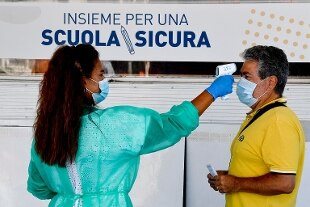The Technical Scientific Committee has given the green light to the indications contained in the circular of the Ministry of Health which spoke, among other things, of the possibility of carrying out rapid swabs in schools for the sole purpose of screening in an anti-Covid prevention key. According to what is learned, there was in fact an agreement in principle during the meeting on the draft of the circular presented by the Ministry of Health in which it is explicitly stated that "for the exclusive purposes of screening it is possible to use antigen tests" in schools . The circular was not on the agenda and was illustrated by the representatives of the ministry. Vaia: we will test 800,000 school children "In our schools we will test a sample of 800,000 children with a pilot test". This "screening has already started with the swab and from next Monday it will also be done with the salivary test". Francesco Vaia, medical director of the Spallanzani Infectious Diseases Institute explained this to Timeline on Sky Tg24, specifying that "we will test in schools of all types and levels throughout Lazio with salivary tests from 3 to 6 years, for the most degrees nasopharyngeal swab ". "As Spallanzani we have validated the antigenic salivary test, which differs from the nasopharyngeal swab because it is less invasive and even the small child can do it. The suspected positivity is followed by confirmation with the molecular test but another sampling with the swab must not be repeated but the former is used, "he explained. The salivary test "gives us great reliability and reliability if used in the right way, that is, to do large testing activities which must be the main activity that public health must undertake". The rapid tests, he specified, "must be used to screen populations in which the presence of the virus is presumed, if then there is a positive suspicion, it must then be confirmed with a second test, which is what triggers the contact tracing and isolation ". In our experience, Vaia concluded, "we have not had false negatives but only false positives": being very sensitive, in fact, "it risks detecting even low viral loads".
Share
29 September 2020 The Technical Scientific Committee has given the green light to the indications contained in the circular of the Ministry of Health which spoke, among other things, of the possibility of carrying out rapid swabs in schools for the sole purpose of screening Covid.
According to what is learned, there was in fact an agreement in principle during the meeting on the draft of the circular presented by the Ministry of Health in which it is explicitly stated that "for the exclusive purposes of screening it is possible to use antigen tests" in schools .
The circular was not on the agenda and was illustrated by the representatives of the ministry.
Vaia: we will
test
800,000 school children
"In our schools we will test a sample of 800,000 children with a pilot test".
This "screening has already started with the swab and from next Monday it will also be done with the salivary test".
Francesco Vaia, medical director of the Spallanzani Infectious Diseases Institute explained this to Timeline on Sky Tg24, specifying that "we will test in schools of all types and levels throughout Lazio with salivary tests from 3 to 6 years, for the most degrees nasopharyngeal swab ".
"As Spallanzani we have validated the antigenic salivary test, which differs from the nasopharyngeal swab because it is less invasive and even the small child can do it. The suspected positivity is followed by confirmation with the molecular test but another sampling with the swab must not be repeated but the former is used, "he explained.
The salivary test "gives us great reliability and reliability if used in the right way, that is, to do large testing activities which must be the main activity that public health must undertake".
The rapid tests, he specified, "must be used to screen populations in which the presence of the virus is presumed, if then there is a positive suspicion, it must then be confirmed with a second test, which is what triggers the contact tracing and isolation ".
In our experience, Vaia concluded, "we have not had false negatives but only false positives": being very sensitive, in fact, "it risks detecting even low viral loads".

